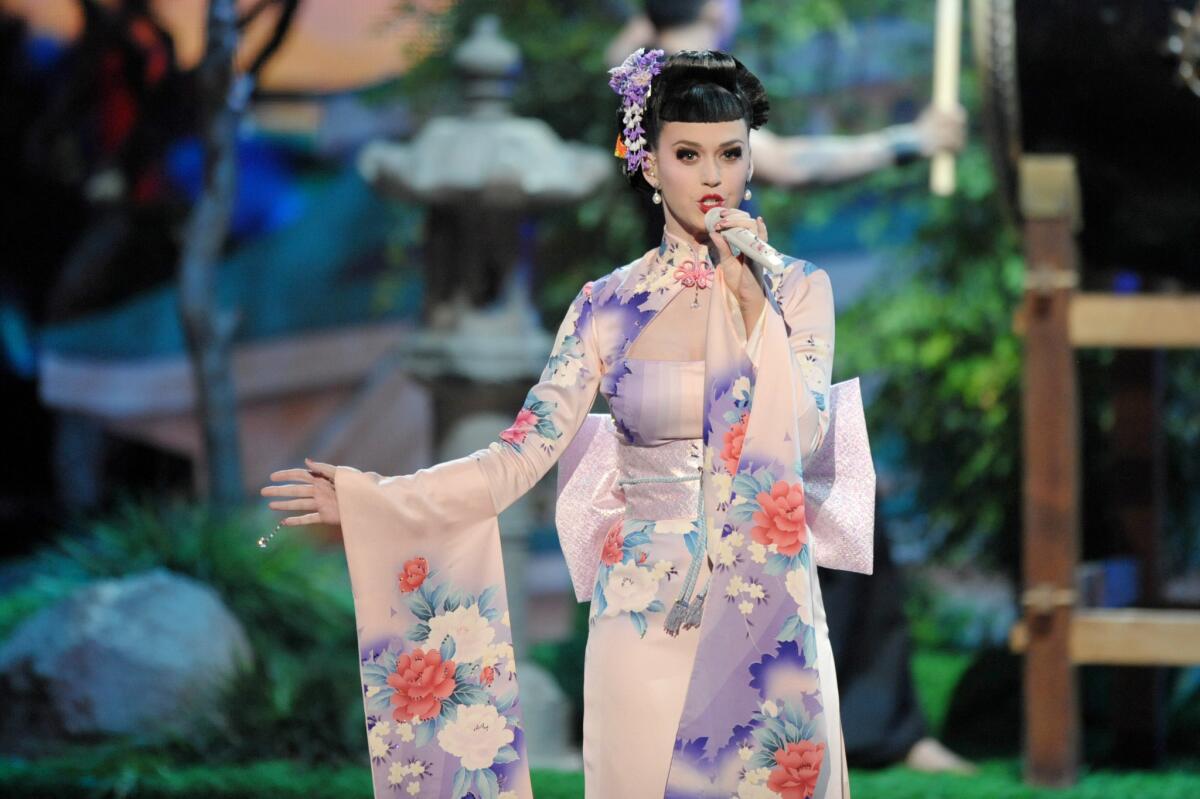Settling the Katy Perry controversy: ‘Yellowface’ is not beautiful

- Share via
I honestly can’t tell what’s more disturbing, the fact that Katy Perry dressed up in “yellowface” or that anyone thought it was “beautiful.” Last weekend, the “I Kissed a Girl” singer appeared at the American Music Awards to perform her new single, “Unconditional,” dressed in a kimono. Perry went all the way with borrowing from Japanese culture, writes Vulture: “geisha moves ... giant fans, cherry blossoms, The Great Wave off Kanagawa, and much more.”
The Wall Street Journal’s Jeff Wang commented that the “performance was also a harsh reminder of how deeply anchored the archetype of the exotic, self-sacrificing ‘lotus blossom’ is in the Western imagination.” However, Chris Talbott of the Associated Press didn’t find anything wrong with it. Talbott responded by saying Perry looked “like a princess out of a classic Japanese painting.”
Here we can see that the bigger issue with Perry’s “demeaning and harmful iconography” is that some people don’t see it as an issue — because cultural appropriation has become so commonplace. As Nolan Feeney of the Atlantic pointed out, this isn’t the first instance of a pop star “parachuting in to Asian culture to play dress-up this year.” It’s the third.
“Both Australian rapper Iggy Azalea and Selena Gomez drew ire when they donned saris and bindis for Azalea’s ‘Bounce’ music video and Gomez’s live performances of ‘Come and Get It,’ respectively,” Feeney wrote. “Despite backlash from Hindu groups objecting to her use of the religious symbol as just a decorative prop, Gomez continued to wear it — and defend her use of it.”
Cultural appropriation has a long, disturbing history in entertainment — from Al Jolson, whose minstrel routines helped popularize blackface, to Gwen Stefani, who used Asian women as human accessories.
Stefani’s 2004 album “Love Angel Music Baby” was inspired by Harajuku culture, and to promote the record, she hired four Japanese women to follow her around. According to Salon’s Mini Ahn, they were “contractually obligated to speak only Japanese in public,” despite the fact that they were American and spoke English. Their major role was to giggle and bow to Stefani.
“That’s right, bowing,” Ahn said at the time. “Not even from the waist, but on the ground in a ‘we’re not worthy, we’re not worthy’ pose. She’s taken Tokyo hipsters, sucked them dry of all their street cred, and turned them into China dolls.”
This year, Miley Cyrus’ reignited the cultural appropriation debate, showing how harmful those images can be for those placed in the background. In her “We Can’t Stop” video, black women perform for Cyrus on the fringes of the screen. They are pushed to the side while Cyrus is “in the center of the frame,” clothed in “ratchet” style — gold teeth, bling and a black skullcap.
In an essay for Jezebel, Dodai Stewart argued that Cyrus was really performing her own privilege. “It’s important to understand that Miley is very privileged to be able to play dress-up and adorn herself with the trappings of an oppressed/minority culture,” wrote Stewart. “She can play at blackness without being burdened by the reality of it.”
The problem with cultural appropriation is that it’s a reminder of the lingering power imbalance between majority groups and those who are historically marginalized. According to Stewart, this is “an environment where people are underprivileged, undereducated, oppressed, underrepresented, disenfranchised, systemically discriminated against and struggling in a system set up to ensure that they fail.” As Tami Winfrey Harris puts it: “It’s about the oppression, stupid.”
This is the exact reason that critics got so upset with Julianne Hough for dressing up as the character Crazy Eyes from “Orange Is the New Black” for Halloween. Here was a wealthy white woman playing dress-up as an imprisoned black woman with a mental illness, treating her struggles as if they were just a cute outfit idea. No one’s oppression should be a costume.
Of course, neither Hough nor Perry and her contemporaries mean to offend anyone, as Hough reminded us in an apology. Neither of these women has to be a leader on racial justice, but their examples are still meaningful to young people who look up to them, many of whom might think its OK to exploit other cultures. After all, they’re just having fun.
Instead of continuing to dress as other cultures, Salon’s Brittney Cooper argues that we can further a culture of understanding when we think about what it’s like to be the Other. What would it feel like to be one of the silent Harajuku Girls or a Japanese person watching Katy Perry onstage? To comedian, Margaret Cho, who’s also commented on this issue, it feels like being “invisible.”
And that’s anything but beautiful.
ALSO:
10 groundbreaking women we lost in 2013
Conspiracy theories: Why we believe the unbelievable
Los Angeles may become a ‘sanctuary city’ for cat lovers
Nico Lang is a contributor at Thought Catalog and co-editor of the “BOYS” anthology series. Follow Nico on Twitter @Nico_Lang.
More to Read
A cure for the common opinion
Get thought-provoking perspectives with our weekly newsletter.
You may occasionally receive promotional content from the Los Angeles Times.










